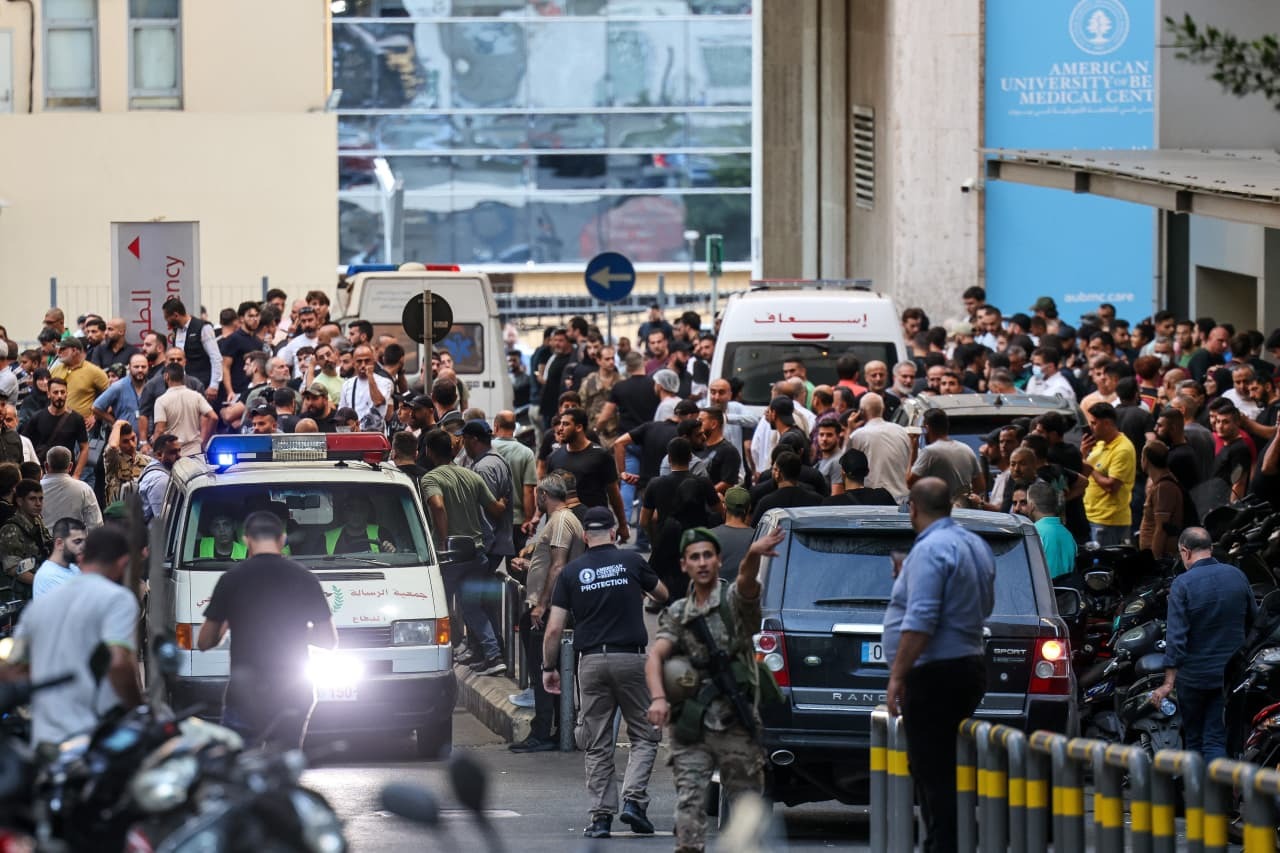Lebanon’s health minister, Dr. Firass Abiad, said in a news conference that eight people were killed [later revised to eleven] by exploding paging devices and more than 2,700 were wounded, including approximately 200 in serious condition.
Dr. Abiad said many of the victims had injuries to their faces, particularly the eyes, as well as to their hands and stomachs. One of those killed was an 8-year-old girl, he said.
Lebanon’s health minister, Dr. Firass Abiad, said on Tuesday evening that health officials were beginning to direct the injured to medical facilities outside of Beirut and its southern suburbs, where hospitals are overwhelmed, state news media reported.
The World Health Organization said it was assisting hospitals in Lebanon and providing supplies because many health facilities were at capacity with injured patients. The U.N.’s public health agency described the situation as an “emergency,” according to a statement.
A doctor who visited hospitals in Sidon where some of the wounded were taken said so many people have suffered wounds to their eyes that there is a shortage of eye surgeons. The doctor, Abdulrahman al Bizri, said the hospitals he visited were flooded with people who have injured eyes, faces and hands, and the medical staffs are struggling to treat them all. “The eye injuries won’t be easy and need long treatment,” he said.
Iran’s ambassador to Lebanon, Mojtaba Amini, lost one eye and severely injured his other eye when a pager he was carrying exploded in a simultaneous wave of blasts targeting wireless electronic devices, according to two members of Iran’s Revolutionary Guards Corps briefed on the attack.
Source: The New York Times
Three minutes from inside the hospital in Lebanon showing how overwhelmed the hospital with Hezbollah’s member after the cyberattack. pic.twitter.com/77aHBUcIRW
— Asaad Sam Hanna (@AsaadHannaa) September 17, 2024
Israel carried out its operation against Hezbollah on Tuesday by hiding explosive material within a new batch of Taiwanese-made pagers imported into Lebanon, according to American and other officials briefed on the operation.
The pagers, which Hezbollah had ordered from Gold Apollo in Taiwan, had been tampered with before they reached Lebanon, according to some of the officials. Most were the company’s AR924 model, though three other Gold Apollo models were also included in the shipment.
The explosive material, as little as one to two ounces, was implanted next to the battery in each pager, two of the officials said. A switch was also embedded that could be triggered remotely to detonate the explosives.
At 3:30 p.m. in Lebanon, the pagers received a message that appeared as though it was coming from Hezbollah’s leadership, two of the officials said. Instead, the message activated the explosives. Lebanon’s health minister told state media at least 11 people were killed and more than 2,700 injured.
The devices were programmed to beep for several seconds before exploding, according to three of the officials.
Hezbollah has accused Israel of orchestrating the attack but has described limited details of its understanding of the operation. Israel has not commented on the attack, nor said it was behind it.
The American and other officials spoke on the condition of anonymity given the sensitive nature of the operation.
Independent cybersecurity experts who have studied footage of the attacks said it was clear that the strength and speed of the explosions were caused by a type of explosive material.
“These pagers were likely modified in some way to cause these types of explosions — the size and strength of the explosion indicates it was not just the battery,” said Mikko Hypponen, a research specialist at the software company WithSecure and a cybercrime adviser to Europol.
Keren Elazari, an Israeli cybersecurity analyst and researcher at Tel Aviv University, said the attacks had targeted Hezbollah where they were most vulnerable.
Earlier this year, Hezbollah’s leader, Hassan Nasrallah, strictly limited the use of cellphones, which he saw as increasingly vulnerable to Israeli surveillance, according to some of the officials as well as security experts.
“This attack hit them in their Achilles’ heel because they took out a central means of communication,” Ms. Elazari said. “We have seen these types of devices, pagers, targeted before but not in an attack this sophisticated.”
Over 3,000 pagers were ordered from the Gold Apollo company in Taiwan, said several of the officials. Hezbollah distributed the pagers to their members throughout Lebanon, with some reaching Hezbollah allies in Iran and Syria. Israel’s attack affected the pagers that were switched on and receiving messages.
It remained unclear on Tuesday precisely when the pagers were ordered and when they arrived in Lebanon.
Source: The New York Times
BREAKING:
Islamic Regime in Iran’s Ambassador to Lebanon Mojtaba Amani arriving at the hospital in a blood-soaked white shirt after having been wounded in a pager explosion pic.twitter.com/I2FKcbHPdV
— Visegrád 24 (@visegrad24) September 17, 2024
A video circulating on social media shows the moment a pager, used by one of Hezbollah members, explodes in a Lebanese wet market. pic.twitter.com/nWsfTeqwRA
— Asia Tech (@asiatechwire) September 18, 2024
The footage from Beirut is shocking.
pic.twitter.com/Tx1kePrqDe— Gaza Notifications (@gazanotice) September 17, 2024




No comments.
By submitting a comment you grant Free West Media a perpetual license to reproduce your words and name/web site in attribution. Inappropriate and irrelevant comments will be removed at an admin’s discretion. Your email is used for verification purposes only, it will never be shared.